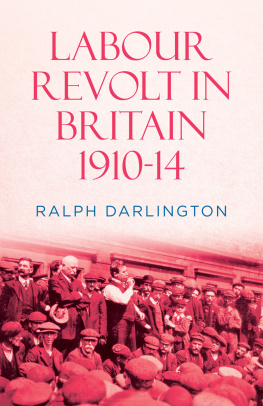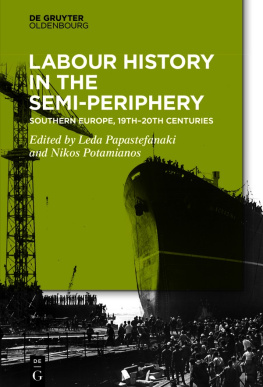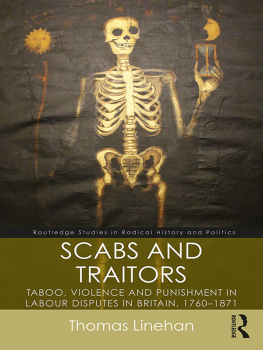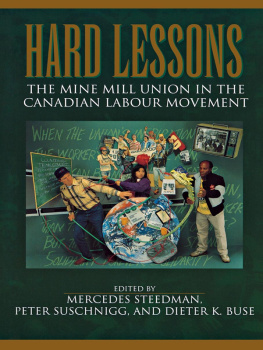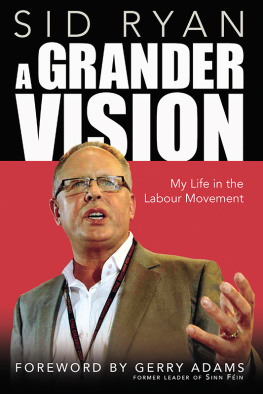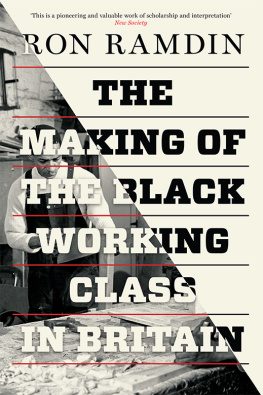Contents
Guide
Labour Revolt in Britain 191014
A fascinating book that reminds us, with passion and vigour, of the years of political and trade union organisation of the English workers movement on the eve of the Great War. Unmissable.
Raquel Varela, labour historian, professor at FCSH-Universidade
Nova de Lisboa and author of A Peoples History of Europe:
From World War I to Today
Drawing on modern historical research, Darlington depicts a broad working-class revolt in which radical activists played an important catalysing role. In discussing both the successes and the failures of the movement, he demonstrates its continued contemporary relevance.
Richard Hyman, Emeritus Professor of Industrial Relations,
London School of Economics, and Founding Editor, European
Journal of Industrial Relations, Fellow of the British Academy
Based on meticulous historical research, this important study refutes once again the myth of working-class quiescence. Addressing the remarkable eruption and trajectory of the great Labour Revolt in the years before World War I, Ralph Darlington reconstructs the many forms of autonomous worker resistance and its entanglement with trade union officialdom, as well as close links to radical socialist politics. His book provides a highly significant new contribution to the analysis of the limits and potential of industrial militancy and its relationship to political action and organisation.
Marcel van der Linden, International Institute
of Social History, Amsterdam
In the first book-length study of the 191014 Labour Revolt, Ralph Darlington convincingly conveys the breadth, depth, and limitations of its many strike movements. Within ten years, British politics, trade unionism and industrial relations would be transformed.
Dr Dave Lyddon, Keele University, founding editor of
Historical Studies in Industrial Relations
A timely warning from history. Rising poverty and strike action. Collective bargaining, a tool for managing workers discontent. Westminster failing workers. An active rank and file holding unions accountable. All vital lessons we must apply during this current period of unrest.
Henry Fowler and Robert Poole, Co-Founders, Strike Map
Ralph Darlingtons book is a major and thorough study of the powerful strike wave of 191014. It was, as he notes, a fulfilment of the promise of New Unionism of 188890. It is an excellent and a timely study given the huge industrial unrest of late 2022.
Chris Wrigley, Emeritus Professor of History, Nottingham University
Labour Revolt in
Britain 191014
Ralph Darlington

First published 2023 by Pluto Press
New Wing, Somerset House, Strand, London WC2R 1LA
and Pluto Press Inc.
1930 Village Center Circle, 3-834, Las Vegas, NV 89134
www.plutobooks.com
Copyright Ralph Darlington 2023
The right of Ralph Darlington to be identified as the author of this work has been asserted in accordance with the Copyright, Designs and Patents Act 1988.
Every effort has been made to trace copyright holders and to obtain their permission for the use of copyright material in this book. The publisher apologises for any errors or omissions in this respect and would be grateful if notified of any corrections that should be incorporated in future reprints or editions.
British Library Cataloguing in Publication Data
A catalogue record for this book is available from the British Library
ISBN 978 0 7453 3903 0 Paperback
ISBN 978 0 7453 4806 3 PDF
ISBN 978 0 7453 4807 0 EPUB
This book is printed on paper suitable for recycling and made from fully managed and sustained forest sources. Logging, pulping and manufacturing processes are expected to conform to the environmental standards of the country of origin.
Typeset by Stanford DTP Services, Northampton, England
Simultaneously printed in the United Kingdom and United States of America
Contents
Figures
)
Tables
Acknowledgements
I would like to express my gratitude to all the archivists and librarians who helped me access material at the National Archives, Kew; Churchill Archives Centre, Cambridge; Modern Records Centre, University of Warwick; Working Class Movement Library, Salford; Labour History Archive and Study Centre, Peoples History Museum, Manchester; University of Manchester Library, University of Salford Library, and Manchester Central Library. I am also indebted to the enormously expanded online material now available on the British Newspaper Archive website.
Thanks to David Howell, Dave Lyddon and Chris Wrigley for providing constructive feedback and advice on my initial book proposal, and to many others who raised probing questions when I presented conference and seminar presentations on different aspects of the research at the International Association of Strikes and Social Conflicts, Australian Society for the Study of Labour History, British Universities Industrial Relations Association, Working Class Movement Library, North East Labour History Society, 1911 Llanelli Railway Strike Festival Historians Forum, and United Voices of the World Union Talks event.
I owe a special debt of gratitude to John Dobson, Silvia Holden, Hamish Mathieson, Ken Mulkearn, Stephen Mustchin, Jack Robertson, Harry Taylor and Martin Upchurch who generously read drafts of individual chapters and/or the entire book manuscript and offered valuable suggestions for improvement, including copyediting amendments. In particular, John Dobsons contribution went beyond the call of comradely duty for which Im so grateful.
Thanks to Pluto Press, particularly David Castle, for backing and overseeing publication.
The book is dedicated to my partner for many years, Carol McFarlane, and daughter Saskia Darlington, for their love, support and encouragement.
Note: Some of the material in the book was published, albeit in a much shorter and differently structured form, in my article Strikers versus Scabs: Violence in the 19101914 British Labour Revolt in Labor History (63: 3) in 2022.
Abbreviations
ASD: Amalgamated Society of Dyers
ASE: Amalgamated Society of Engineers
ASLEF: Associated Society of Locomotive Engineers and Firemen
ASRS: Amalgamated Society of Railway Servants
ASWL&B: Amalgamated Society of Watermen, Lightermen and Bargemen BAIU: British Advocates of Industrial Unionism
BSP: British Socialist Party
BWIU: Building Workers Industrial Union
CGT: Confdration Gnrale du Travail
CLC: Central Labour College
CPGB: Communist Party of Great Britain
DDJFWU: Dundee and District Jute and Flax Workers Union
DMA: Durham Miners Association
DWRGWU: Dock, Wharf, Riverside and General Workers Union
ELF: East London Federation
ELFS: East London Federation of the Suffragettes
GRWU: General Railway Workers Union
IDL: Industrial Democracy League
ILP: Independent Labour Party
IRA: Irish Republican Army
IRB: Irish Republican Brotherhood
IRSP: Irish Socialist Republican Party
ISEL: Industrial Syndicalist Education League
ITGWU: Irish Transport and General Workers Union
ITUC: Irish Trades Unions Congress
IWGB: Industrial Workers of Great Britain
IWW: Industrial Workers of the World
IWWU: Irish Women Workers Union

